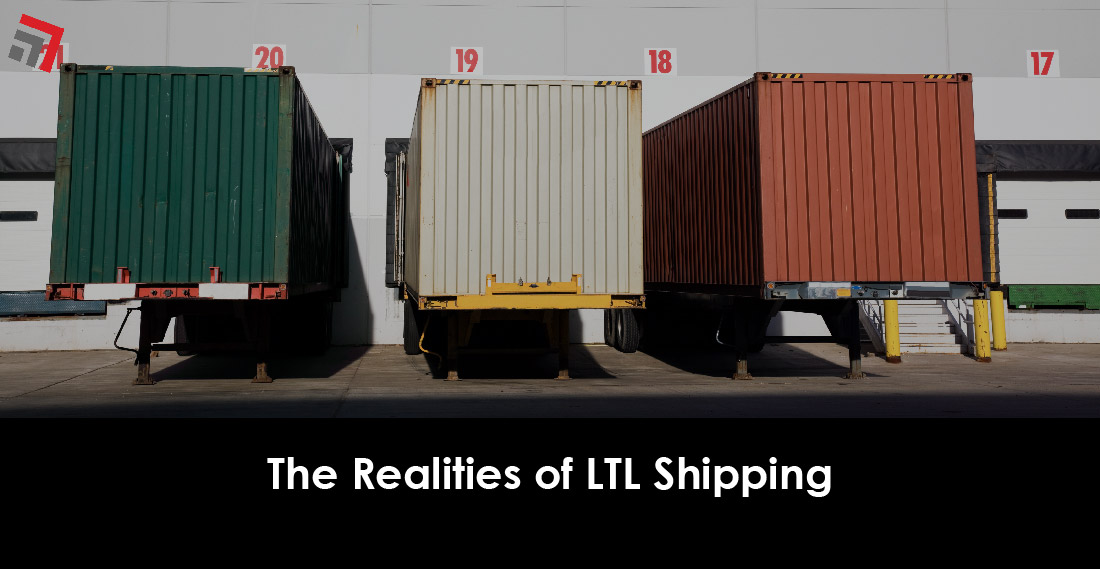Less-than-truckload shipping can act as a godsend for businesses who regularly push out or bring in a small amount of goods per shipment. The operating model places several separate loads all into one trailer. These combined loads form one multi-stop truckload, as the truck delivers to the respective drop-off points of each shipment. The individual, separate, businesses (shippers) are then charged on the amount of space their own load used, the type of good that was shipped, and the location of the pickup/destination.
After all, can one imagine paying to utilize a whole trailer (full truckload) if they only had to ship a pallet or two? It would be an impractical and unnecessary expense. That’s why LTL makes sense for shippers who have loads that won’t come near filling up the space of an entire trailer. The model will save them money on transportation costs.
That said, here’s a hypothetical: let’s say you have a ready shipment that fits the ideal service description for LTL shipping. While the model clearly presents a cost-effective solution in theory, there are certain realities you and your supply chain partners should understand before booking an LTL service. After all, like any transportation option, LTL carries strengths (cost savings), but also unsavory surprises that can impact your business if you’re not expecting or aware of them. These could be in the form of unexpected charges, longer transit times, or a higher chance of damage to your goods.
Unexpected charges
Why are there so many typos on my invoice? My invoice says what?
If you’re a seasoned supply chain professional, odds are, despite your supply chain savvy, you’ve found yourself mumbling these questions at least once as you try to make sense of the mystifying charges that populate your freight invoice—charges that up until you read the bill were never considered a scenario.
In the realm of LTL shipping, the (initial) price isn’t always right. The rate that you book an LTL shipment at may not be the final price you pay upon delivery. For experienced LTL shippers, this is a rule of the trade that they’ve come to expect, but for ones unfamiliar with the model, they may find themselves spitting out their hot coffee onto a freight bill one fateful Tuesday morning.
The primary reasons why the final bill may not match what the price you’ve booked or quoted at:
- The initial quote or booking offered to by an LTL carrier misrepresented the weight and dimensions of your freight
- Accessorial fees on services that your shipment required, but you didn’t communicate prior to booking (such services could include inside or limited-access deliveries)
- Accessorial fees on delays in the shipment that the carrier will pass on (possible reasons for delay could include inspection or redelivery)
- Oversize fees on your shipments (this includes freight overhanging from a pallet)
While a mismatched invoice can, and has, surprised many supply chain professionals new to LTL shipping, the reasons above are not shady or intended to mislead. These fees represent the sensitivity of LTL’s pricing structure and operations, while further stressing the need for shippers to be extra diligent prior to booking a shipment.
For LTL shipping, we—Commerce Express Inc.—recommend that you work with a third-party logistics provider, or freight broker, to ensure your service requirements and details are in order before you receive a quote or request to book. That way it’s less likely that a carrier will pass an unexpected fee on to you. Communication between involved parties regarding receiving issues or mispackaged freight can help identify whether certain charges will be added to your bill prior to the final invoice. In some cases, active communication can also give shippers an opportunity to correct issues that are discovered, avoiding potential charges.
Longer transit time
Off its operating definition, even outsiders not working logistics would guess that LTL shipping provides longer transit times than one-stop full truckload or two or three stop partial load shipments. Of course, this guess would be correct. However, what logistics outsiders, and even newer members of the supply chain community, may not know is that LTL shipments don’t even allow for a delivery date.
How come this crucial bit of information is impossible to receive beforehand?
While your individual shipment may only occupy a small corner in a single trailer, altogether a high volume of LTL freight must be moved on any given day. To manage this demand, LTL carriers rely on a hub-and-spoke network of terminals and lanes. In other words, your shipment bounces around a complex web of transfer points, ultimately, at some point, arriving at its intended destination.
Given the number of shipments in circulation of these vast networks, there exists a greater likelihood of delays or missed pickups. Delays within these systems could last a day or two, especially if your shipment has special requirements, such as a short or limited pick-up window.
The complexity of the LTL business model seldom guarantees predetermined delivery dates and times. It’s not uncommon for shipping times to stretch past their target window. If you’re an LTL shipper who is concerned about unreliable transit times, we recommend you consult with a 3PL for an understanding of which carriers and service options are the best for your specific needs. After all, 3PLs like Commerce Express Inc. have decades of experience working with LTL carriers and have accumulated enough data into their strengths and weaknesses in service.
Higher chance of cargo damage
So, there’s certainly truth to this concern. LTL shipments are handled and transferred through a number of facilities and transfer points. Whenever cargo is being handled, there’s the risk of it being dropped or incorrectly loaded, while a journey through multiple points raises the risk of the cargo being misdirected or left behind. The arrangements within a trailer of LTL shipments are also not pretty like puzzles most of the time. The freight of various shippers come in different shapes and sizes, making some not sit so nicely together.
But admittedly, cargo damage has been sensationalized among stakeholders over the years. Yes, LTL shipping carries a higher risk of cargo damage and loss than partial or full-truckload shipping, but the chances of being a victim to this are smaller than you think. That said, we say this as a means to lower your heartrate and worry less about your freight while in transit. However, we don’t say this as a reason to discourage you from protecting your freight.
We recommend you package and stack your freight carefully. If any part of your shipment is fragile, label it clearly for truck drivers, dockworkers, or any other handler. In the case of damage or loss of cargo, report it as soon as possible to the truck driver. This step is important as claims are often denied if damage or loss goes unreported.
From there, you can choose to file a claim. While this can be done by yourself, 3PLs can lessen the burden that comes from it. Commerce Express Inc. takes charge of the claim procedure. From documentation to seamless coordination with insurers, we ensure a smooth and efficient claims resolution. By integrating cargo insurance with a proactive approach to managing claims, we provide our clients with a comprehensive risk management solution, empowering them to navigate the intricacies of global supply chains with confidence and resilience.
Are you an LTL shipper in need of options?




Recent Comments